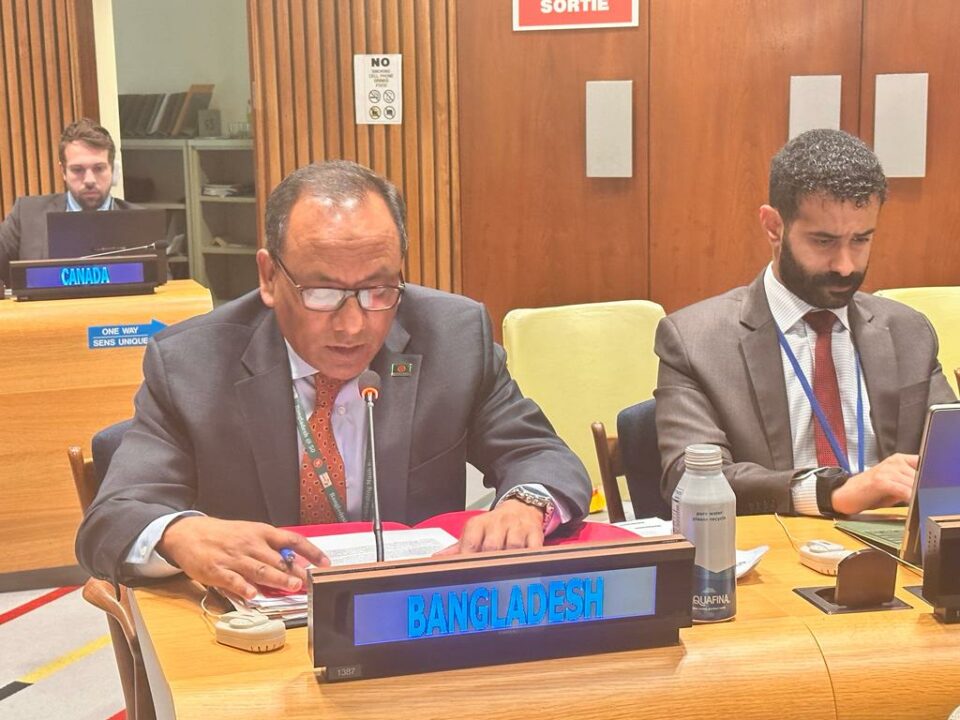Mr. Chair,
As I address the Committee for the first time during the 78th Session, I warmly congratulate you and other Bureau members on your well-deserved election. Bangladesh aligns itself with the statement delivered by NAM under this agenda item. Additionally, I have the honor to share the following remarks in my national capacity.
Mr. Chair
UN officials and experts on missions play central role in upholding international peace and security. Since the establishment of the first peacekeeping mission in 1948, they have demonstrated unwavering commitment, often sacrificing their lives in the pursuit of global peace, security, and the protection of vulnerable populations during conflicts and wars. As of today, Bangladesh lost 167 peacekeepers in the line of duty. We pay deep tribute to all peacekeepers for their exceptional bravery and supreme sacrifice.
While we commend the invaluable contributions of UN peacekeeping personnel to global peace and security, we must equally emphasize the need for accountability when individuals associated with these missions engage in criminal activities. Any allegations of wrongdoing against these individuals should be promptly and thoroughly investigated and resolved to uphold the image, credibility, and integrity of the United Nations and its Charter principles.
Mr. Chair,
Currently, Bangladesh is the top Troops and Police contributing country with more than 7,000 peacekeepers deployed in 11 peace operations. As top TPCC, Bangladesh attaches utmost importance to the issue of criminal accountability of UN officials and experts on missions. We maintain a ‘zero tolerance’ policy on any allegations of misconduct against our peacekeepers, including the allegations of sexual exploitation and abuse.
Prime Minister of Bangladesh Her Excellency Sheikh Hasina was one of the first members of the Secretary General’s Circle of Leadership against sexual exploitation and abuse. We are also one of the earliest endorsers of the Secretary General’s voluntary compact on preventing and addressing sexual exploitation and abuse.
At the national level, we have put in place various policy measures to address the various forms of criminal activities that may be committed by peacekeepers. Bangladesh Armed Forces and Police Force who serve as peacekeepers in Missions are subject to a system of military or police discipline, thereby ensuring accountability at all times.
During pre-deployment training, our peacekeepers are made aware of possible repercussions for lapses or acts of sexual exploitation and abuse and other crimes. We have developed customized training module taking into account the unique cultural settings of different field missions.
However, we express our deep regret that the UN personnel, especially the peacekeepers continue to remain targets in the field and the measures to ensure accountability for the crimes against them remain grossly inadequate. We call for appropriate actions by both the UN and host countries to end such targeting of peacekeepers.
Mr. Chair,
Despite significant efforts across the UN system to ensure the criminal accountability of UN officials and experts on mission, various forms of misconduct continue to persist. To strengthen our collective commitment to eradicating this problem, I would like to flag a few points:
First, prevention is always better than cure. The UN system as well as the member states with personnel deployed or employed in the UN and in the expert missions need to invest more in preventive measures. In this regard, developing customized training modules for in-mission and pre-deployment trainings, including refresher trainings, is important. Equally important is to ensure access to those training materials, especially including in the native languages.
Second, it is important to harmonize the standards of investigation of such crimes allegedly committed by United Nations officials and experts on mission. In this regard, regular exchange of information and sharing best practices among the stakeholders is important. We note with appreciation various measures taken by the UN to that end, including by providing a platform for discussion.
Third, ensuring criminal accountability of UN personnel and experts on Missions is a shared responsibility. We encourage all parties to collaborate, including by providing timely information and other materials required for investigations and criminal proceedings.
However, it is imperative to exercise extreme caution to safeguard the confidentiality of communications regarding allegations of misconduct. This is crucial to prevent unfair stigmatization of individuals, especially when allegations have yet to be proven beyond reasonable doubt.
Fourth, it is critical to ensure the capacity building of the host country particularly by strengthening the Judicial and Security Sector. Bangladesh has been contributing to the Judicial and Security Sector strengthening in several peacekeeping operations. Bangladeshi Judges are deployed in peacekeeping operations to support the host country.
Lastly, while addressing the issue of criminal accountability, we must prioritize the rights and protection of victims. Bangladesh, as a manifestation of its victim-centric approach, earlier voluntarily contributed $100,000 and has recently pledged to contribute $50, 000 to the Trust Fund established by the Secretary General. We call for enhanced measures to support victims of misconduct in coordination with the victim’s home country.
I thank you, Mr. Chair.

